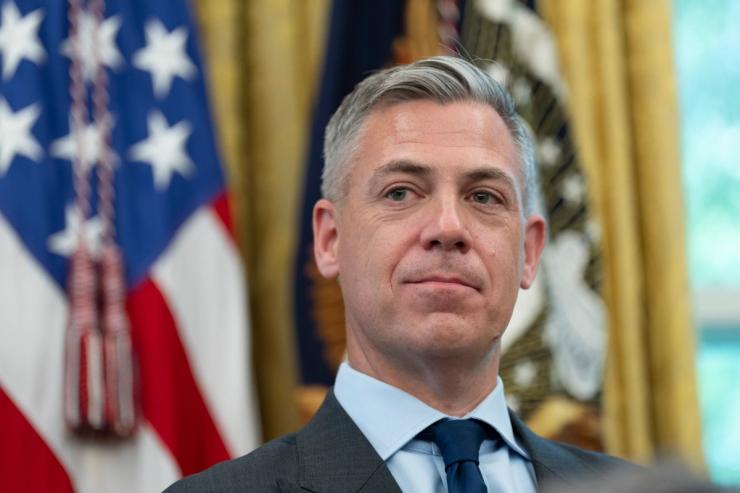The News
Only 15 senators in both parties are withholding support from the chamber’s stalled Russia sanctions bill, and a half-dozen Republicans in that camp have a telling explanation: They’re waiting for President Donald Trump to greenlight it.
It’s the latest sign of Trump’s ironclad grip on the Senate GOP, which asserted more independence on foreign policy during his first term. The arrival of MAGA-minded freshmen senators like Indiana’s Jim Banks and Ohio’s Bernie Moreno pads the party’s less-hawkish ranks beyond contrarians like Kentucky’s Rand Paul and Utah’s Mike Lee (as long as Trump aligns with them).
Which means that, as lawmakers approach their summer break, the chances are nearing zero that the Senate would get ahead of the president on Russia sanctions.
“When President Trump wants me to sign onto it, I’ll sign onto it,” Banks said. “I want to give the president the flexibility he needs to do what he has to do.”
As the bipartisan proposal languishes, 11 Republicans and four Democratic caucus members aren’t signed on. The group includes former Trump administration ambassador Bill Hagerty of Tennessee, the self-proclaimed non-interventionist Paul, and one of Democrats’ leading foreign policy voices, Chris Murphy of Connecticut.
A handful of the holdouts, including Murphy, have their own policy or political reasons. But for Republicans, Trump’s resistance is the most common rationale.
Sen. Ron Johnson, R-Wis., another Republican absent from the 85 sponsors of the sanctions bill, said simply: “I take the lead from President Trump in terms of what he wants to do.”
If there’s a bright spot for GOP leaders, it’s that opposition to the bill would instantly fade with Trump’s endorsement. As Senate Majority Leader John Thune put it to Semafor: “If the White House is behind moving it, I assume it gets most Rs.”
Some Republicans want to move on punishing Vladimir Putin, with or without the president’s explicit backing. But it’s clear that that simply will not happen in Trump’s Washington.
Know More
The White House is working behind the scenes to soften the language in the bill, which as currently written would impose 500% tariffs on countries that import Russian energy. The idea is to further squeeze the Russian economy, forcing Putin to the negotiating table with Ukraine.
Sens. Lindsey Graham, R-S.C., and Richard Blumenthal, D-Conn., have explored exemptions for countries aiding Ukraine, as well as more flexibility for Trump and future presidents.
Graham insists the president is okay with the bill. That’s not entirely true; Trump has flirted with supporting the legislation, but most recently he’s suggested it may not be needed — and that he’ll act unilaterally instead if Moscow does not show serious interest in peace talks by September.
“President Trump has proposed something different than was in the bill, so I’d rather give him the latitude to figure out what needs to be done,” Moreno said.
“I support kneecapping [Putin],” he added. “But I also don’t want to hinder the president’s ability to do what he needs to do.”
Without unanimous support, the Senate can’t advance the bill without eating up precious floor time. And Thune is indicating there’s no particular urgency behind Russia sanctions, despite murmurs earlier this month that the bill could pass before Congress’ August recess.
Now Republicans are giving Trump his 50-day clock for Putin to come around before trying to bring the bill to the floor. That drags the bill into September, when it could get delayed further due to the impending government funding deadline.
The View From Democrats
In general, Democrats are more vocal than their Republican colleagues about backing Ukraine and standing up to Russia. Even so, four members of the caucus are not on the bill: Murphy; Catherine Cortez Masto, D-Nev.; Ron Wyden, D-Ore.; and progressive Bernie Sanders, I-Vt.
Murphy’s absence is particularly striking, given his foreign policy chops. He told Semafor that while the bill is an “incredibly sincere effort,” he doesn’t want it to be viewed as a substitute for more military aid for Ukraine (which the Republican-controlled Congress is highly unlikely to approve).
“I think for some Republicans, that bill could be their get-well box and absolve them of the responsibility to do the harder thing that is absolutely a necessary predicate to save Ukraine,” Murphy said, making clear that he isn’t actually opposed to the sanctions bill.
Room for Disagreement
Paul is one of the bill’s most vocal critics. He won’t back it even if Trump throws his support behind it eventually.
“It would be devastating to world trade and probably the most injurious to our economy of any legislation ever, really. So, hopefully it won’t come up,” he told Semafor.
Paul added that he doesn’t support Trump’s alternative pitch of 100% tariffs on Russian trading partners. “Even that would be terrible,” he said.
Notable
- Talks between Ukraine and Russia made little progress on Wednesday, lasting less than an hour, CNN reported.
- Trump predicted Friday that Putin and Ukrainian President Volodymyr Zelenskyy would eventually sit down with one another. “It should have happened three months ago,” he told reporters.

